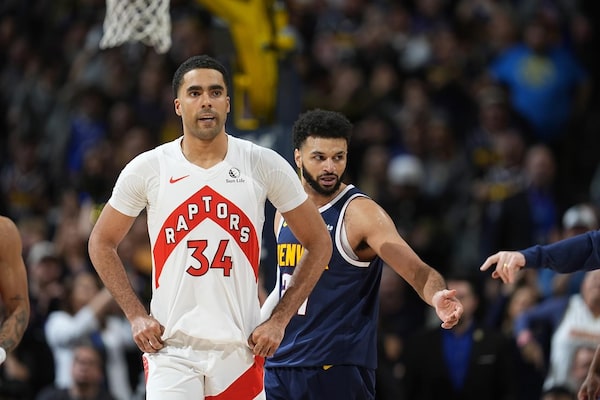
Toronto Raptors centre Jontay Porter, left, had played 26 games for the team, starting in five of them, when he was suspended last month.David Zalubowski/The Associated Press
A once-promising player with the Toronto Raptors was banned for life by the National Basketball Association on Wednesday after the league said he had disclosed confidential information to sports bettors and wagered on NBA games.
Jontay Porter, 24, is the first athlete to be banned for life by a major North American league since single-event sports gambling was legalized in the United States in 2018 and in Canada in 2021.
The league added that Mr. Porter had placed at least 13 bets on NBA games using the online betting account of an associate, while travelling with the Raptors or their development-league team, between January and March of this year. In one instance, he bet against the Raptors; the team won. The league said Mr. Porter did not play in any of the games he wagered on.
His case is just one of a series of high-profile betting-related scandals as sports gambling explodes in popularity. Last week, the former interpreter for Los Angeles Dodgers star Shohei Ohtani was charged with bank fraud after allegedly stealing from the pitcher to pay off millions in sports-gambling debts.
“It’s inevitable that we’ll see more of these situations occurring,” said Jeremy Luke, the president and CEO of the Canadian Centre for Ethics in Sport. “Given the legalization of single-event sport betting in Canada, and the volume of gambling and advertising associated with sporting events now, competition manipulation is a real risk to the integrity of sport, it’s a risk to the safety of athletes.”
Mr. Porter, who signed with the Raptors midway through the season in hopes of finally making a real run in the big leagues, is a former college star. He had a partial-season contract worth about US$410,000 after spending time with the club’s development-league team, Raptors 905. If things had gone well, he would have been eligible for a contract next season of approximately US$2.1-million.
Mr. Porter had played 26 games for the Raptors, starting in five of them, when he was suspended last month after allegations surfaced that someone had placed a US$80,000 wager that Mr. Porter would make fewer than two three-point baskets during the team’s game on March 20 against the Sacramento Kings. He had played less than three minutes of the game, missing one field-goal attempt – and not even attempting any three-point shots – before pulling himself out of the lineup, citing ill health.
The size of the bet, of a sort known as a proposition or “prop” bet, in which gamblers wager on the outcome of a single event in a game, such as a strikeout in baseball or a goal in hockey, was unusual, given that Mr. Porter was a low-visibility player who was unlikely to attract much betting action.
The bet, which would have paid out more than US$1.1-million, was cancelled by the unidentified sportsbook. The NBA said the bet was brought to the league’s attention “by licenced sports betting operators and an organization that monitors legal betting markets.”
Declan Hill: The rise of sports betting could kill off an entire sports league
In a statement, NBA commissioner Adam Silver said that, while “legal sports betting creates transparency that helps identify suspicious or abnormal activity, this matter also raises important issues about the sufficiency of the regulatory framework currently in place, including the types of bets offered on our games and players.”
“The Raptors are fully supportive of the league’s decision to ban Jontay Porter from the NBA and are grateful for the swift resolution to this investigation,” the club said in a statement e-mailed to The Globe and Mail. “We will continue to co-operate with all ongoing inquiries.”
The news came on the same day iGaming Ontario, the agency responsible for administering internet-based gambling in the province, said Ontarians wagered $9.7-billion on sports during the second year of regulated online gambling in the province, which ended March 31. The industry took in $588-million in revenue for sports gambling during that period.
Ontarians wagered a total of $63-billion in online gambling, including casino games, from April 1, 2023, to March 31, 2024. That represented an increase of 78 per cent year-over-year, with gambling operators earning $2.4-billion in revenue during the period.
While pro athletes and team employees have attracted the most attention for sports gambling activities, Mr. Luke noted that match fixing “often occurs with athletes who make less money than professional athletes. The temptation is greater, and the risks for individuals to be targeted or groomed to do these types of things is also greater.”
Last month, the CCES issued a white paper on competition manipulation that urged the federal government to take a series of steps to reduce the potential risks to athletes and sports organizations.